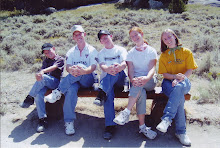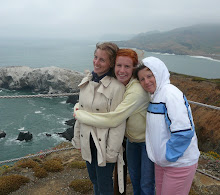It is now 12:04 a.m. on May 18th, 2009.
I've been twenty years old for four whole minutes. And I don't feel any different than before.
Well, technically, I suppose that I'm not REALLY twenty yet. That won't happen till 12:41 p.m., and even then, since I was born in California, I won't really be twenty till 1:41 p.m. here in Provo, if we're going by actual California time.
I think for a lot of people, turning twenty is a milestone--a big deal that they're no longer a teenager and all of that--but I guess for me, it's not so much. My teenager years were great and all, but I'm not terribly nostalgic and wistful for them to return. Also, since my dear friend Tracy turned twenty, I've been contemplating the prospect and I'm pretty used to the idea. In fact, when people have asked me how old I am for the past few months, I've answered, "Twenty," without realizing that that wasn't exactly truthful yet. I think more than anything, I am anxious and anticipating what's ahead in the coming decade. Though I don't know what exactly will happen, some definite possibilities include: graduating with a bachelor's, (that's definite though--I will definitely graduate) go on a mission, learn another language, get married, go to grad school, get a real job in the professional world, have children, (whoa.) buy my own car and health insurance, live in my first place without my wonderful roommates (best friends) or my family, and a bajillion other things. Wow. And I look at that list, and I start getting both really excited and nervous.
However, though it is a little frightening, I also look at that list and I realize how incredibly blessed I am to even have those things as possibilities and opportunities. That list includes the catalysts to nearly everything that I have hoped and dreamed for all of my life (minus the insurance purchases, naturally). And look--they're all things that could very feasibly happen in this decade. So whether they do or don't, the future is holding a whole bunch of possibilities. And that is enough to get a girl excited about turning twenty.
In the style of Humphrey Bogart, I say:
"Here's lookin' at you, world."
Give me your best shot. I'm ready to take it on.
I've been twenty years old for four whole minutes. And I don't feel any different than before.
Well, technically, I suppose that I'm not REALLY twenty yet. That won't happen till 12:41 p.m., and even then, since I was born in California, I won't really be twenty till 1:41 p.m. here in Provo, if we're going by actual California time.
I think for a lot of people, turning twenty is a milestone--a big deal that they're no longer a teenager and all of that--but I guess for me, it's not so much. My teenager years were great and all, but I'm not terribly nostalgic and wistful for them to return. Also, since my dear friend Tracy turned twenty, I've been contemplating the prospect and I'm pretty used to the idea. In fact, when people have asked me how old I am for the past few months, I've answered, "Twenty," without realizing that that wasn't exactly truthful yet. I think more than anything, I am anxious and anticipating what's ahead in the coming decade. Though I don't know what exactly will happen, some definite possibilities include: graduating with a bachelor's, (that's definite though--I will definitely graduate) go on a mission, learn another language, get married, go to grad school, get a real job in the professional world, have children, (whoa.) buy my own car and health insurance, live in my first place without my wonderful roommates (best friends) or my family, and a bajillion other things. Wow. And I look at that list, and I start getting both really excited and nervous.
However, though it is a little frightening, I also look at that list and I realize how incredibly blessed I am to even have those things as possibilities and opportunities. That list includes the catalysts to nearly everything that I have hoped and dreamed for all of my life (minus the insurance purchases, naturally). And look--they're all things that could very feasibly happen in this decade. So whether they do or don't, the future is holding a whole bunch of possibilities. And that is enough to get a girl excited about turning twenty.
In the style of Humphrey Bogart, I say:
"Here's lookin' at you, world."
Give me your best shot. I'm ready to take it on.




.jpg)






